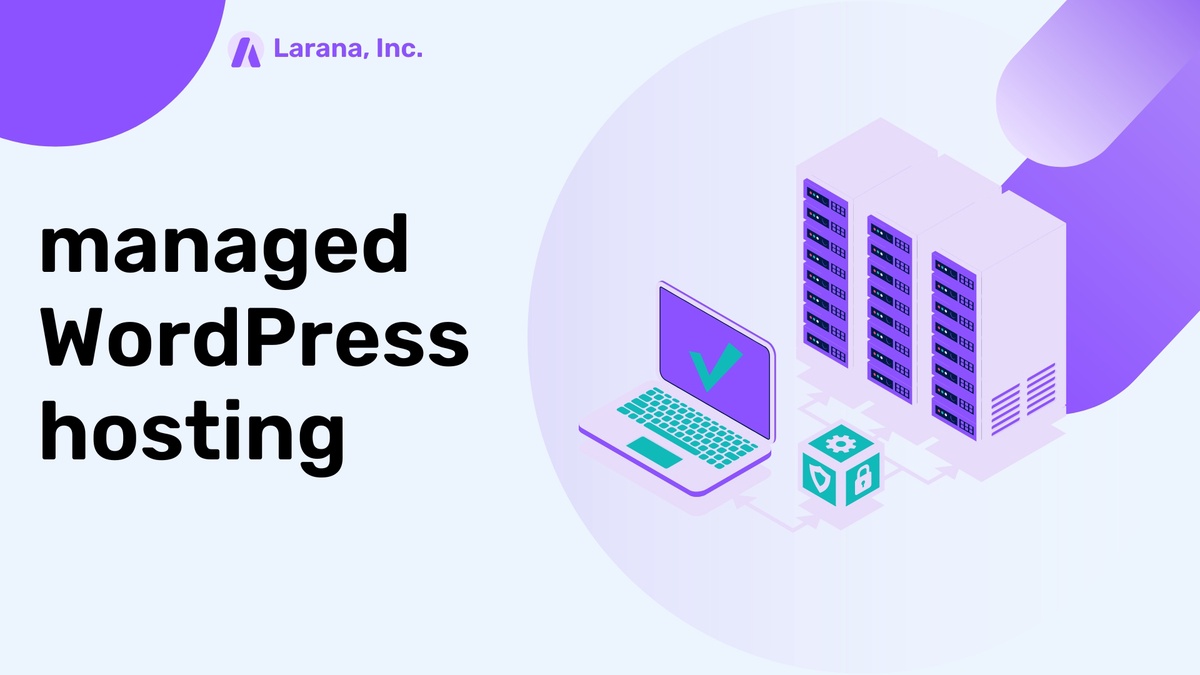Managed WordPress hosting is a type of web hosting service that is specifically designed for WordPress websites. With managed WordPress hosting, the hosting provider takes care of the technical aspects of running a WordPress website, such as server management, security, backups, and software updates, allowing website owners to focus on creating and publishing content.
Managed WordPress hosting providers typically offer a range of features and services that are optimized for WordPress, such as one-click installations, automatic backups, staging environments, and performance optimization. They also offer dedicated support teams that are knowledgeable about WordPress and can help troubleshoot issues and provide advice on best practices.
One of the main benefits of managed WordPress hosting is improved website performance and security. Managed hosting providers typically use specialized infrastructure and server configurations that are optimized for WordPress, resulting in faster loading times and improved uptime. Additionally, they often provide advanced security measures, such as firewalls, malware scanning, and automated updates, to protect websites from hacking attempts and other security threats.
While managed WordPress hosting can be more expensive than traditional shared hosting, it offers a range of benefits and can be a worthwhile investment for website owners who want to ensure their WordPress websites are secure, fast, and reliable.

Understanding Managed WordPress Hosting
Managed WordPress hosting is a specialized type of web hosting that is specifically optimized for WordPress websites. This type of hosting is designed to make running a WordPress site easier and more efficient.
With managed WordPress hosting, the hosting provider takes care of many of the technical aspects of managing a website, such as updates, backups, security, and performance optimization. This allows website owners to focus on creating content and running their business, rather than worrying about the technical details.
Some of the key features of managed WordPress hosting include:
-
WordPress-specific support: Managed WordPress hosting providers typically offer support from experts who are familiar with the WordPress platform and can help troubleshoot issues specific to WordPress.
-
Automatic updates: Managed WordPress hosting providers will automatically update the WordPress core software, as well as any plugins or themes that are installed on the site. This helps to keep the site secure and up-to-date.
-
Enhanced security: Managed WordPress hosting providers will often include extra security features, such as firewalls and malware scanning, to help protect the site from hacking attempts and other security threats.
-
Performance optimization: Managed WordPress hosting providers will often optimize the site's performance by using caching, content delivery networks (CDNs), and other techniques to speed up the site and reduce load times.
-
Backup and restore: Managed WordPress hosting providers typically offer regular backups of the site, which can be quickly restored in the event of a problem.
Managed WordPress hosting is generally more expensive than traditional shared hosting, but it can be a worthwhile investment for those who want to focus on their website content and leave the technical details to the experts.
Choosing the Best Managed WordPress Hosting Provider
Choosing the best managed WordPress hosting provider can be a crucial decision for your website's success. Here are some factors to consider when selecting a managed WordPress hosting provider:
-
Performance and Speed: Look for a hosting provider that offers fast and reliable performance. Your website's speed is crucial for user experience and SEO rankings.
-
Security: Make sure the hosting provider offers robust security features, such as malware scanning, firewalls, and SSL certificates.
-
Support: Check if the hosting provider offers 24/7 support and various channels for communication, such as live chat, phone, and email.
-
Scalability: Choose a hosting provider that can accommodate your website's growth and handle high traffic volumes.
-
User-friendly interface: The hosting provider should offer an easy-to-use dashboard that enables you to manage your website's settings, install WordPress themes and plugins, and access website backups and analytics.
-
Pricing: Consider the hosting provider's pricing and whether it fits your budget. Look for a provider that offers a transparent pricing model without hidden fees.
Some of the popular managed WordPress hosting providers are WP Engine, Kinsta, SiteGround, Flywheel, and Liquid Web. Compare their features, pricing, and user reviews before making a decision.
Managed WordPress Hosting Features and Services
Managed WordPress hosting is a type of hosting service specifically designed for WordPress sites, offering a range of features and services to optimize performance, security, and ease of use. Here are some of the key features and services typically offered by managed WordPress hosting providers:
-
Automatic WordPress updates: Managed WordPress hosting providers will automatically update your WordPress installation, plugins, and themes to keep your site secure and up to date.
-
Optimized server environment: Managed WordPress hosting providers use specialized server environments optimized for WordPress, resulting in faster page load times and improved site performance.
-
Enhanced security: Managed WordPress hosting providers typically include advanced security measures such as malware scans, firewalls, and DDoS protection to keep your site safe from threats.
-
Daily backups: Managed WordPress hosting providers will automatically backup your site on a regular basis, giving you peace of mind in case of a site crash or data loss.
-
Expert support: Managed WordPress hosting providers offer expert support from WordPress specialists who can assist with any technical issues or questions you may have.
-
Easy site management: Managed WordPress hosting providers typically offer easy-to-use control panels and site management tools, making it easy for you to manage your site, update content, and perform other tasks.
-
Developer-friendly features: Managed WordPress hosting providers may also offer developer-friendly features such as staging environments, Git integration, and access to developer tools and resources.
Overall, managed WordPress hosting can be a great option for anyone looking for a hassle-free, secure, and high-performing hosting solution for their WordPress site.
Managed WordPress Hosting Providers Comparison
There are many managed WordPress hosting providers available in the market. Here is a comparison of some popular ones:
-
WP Engine: WP Engine is a popular managed WordPress hosting provider that offers reliable and secure hosting services. They offer a range of plans to suit different budgets and needs, with features such as automated backups, 24/7 support, and advanced security.
-
Flywheel: Flywheel is another popular managed WordPress hosting provider that offers easy-to-use features and excellent customer support. They offer a range of plans, including custom plans for large enterprises, with features such as automatic backups, staging environments, and a free SSL certificate.
-
Kinsta: Kinsta is a premium managed WordPress hosting provider that offers high-performance hosting with excellent uptime and fast loading speeds. They offer a range of plans, including custom plans for large enterprises, with features such as automatic daily backups, staging environments, and advanced security.
-
SiteGround: SiteGround is a popular managed WordPress hosting provider that offers affordable hosting with excellent customer support. They offer a range of plans to suit different budgets and needs, with features such as daily backups, staging environments, and advanced security.
-
Bluehost: Bluehost is a popular web hosting provider that also offers managed WordPress hosting. They offer affordable plans with features such as automatic backups, 24/7 support, and a free domain name for the first year.
Ultimately, the best managed WordPress hosting provider for you will depend on your specific needs and budget. It's important to consider factors such as uptime, speed, security, and customer support when making a decision.
Best Practices for Managing WordPress Websites on Managed Hosting
Managing a WordPress website on managed hosting can be easy and efficient with the right best practices in place. Here are some best practices for managing WordPress websites on managed hosting:
-
Keep WordPress and plugins updated: Regularly updating WordPress and its plugins can help improve the security of your website and prevent it from being hacked. Managed hosting providers usually offer automatic updates, but it's still a good idea to check and ensure that everything is up to date.
-
Use strong passwords: Use strong passwords for all user accounts, including the administrator account. A strong password is a combination of uppercase and lowercase letters, numbers, and symbols. Consider using a password manager to generate and store strong passwords.
-
Enable Two-Factor Authentication (2FA): Enable two-factor authentication (2FA) for all user accounts, including the administrator account. This adds an extra layer of security to your website and prevents unauthorized access.
-
Regularly backup your website: Backup your website regularly, either manually or automatically. Managed hosting providers usually offer automatic backups, but it's a good idea to check and ensure that everything is being backed up properly. Additionally, it is a good practice to store backups off-site, in case of any data loss.
-
Use a reliable security plugin: Use a reliable security plugin to help protect your website from hacks and malware. Plugins like Wordfence or Sucuri can help scan your website for vulnerabilities and protect against malicious attacks.
-
Optimize your website for speed: Optimize your website for speed by using a caching plugin, optimizing images, and minimizing the use of unnecessary plugins. This will help improve the user experience and SEO ranking.
-
Monitor website performance: Monitor website performance regularly to ensure everything is running smoothly. Managed hosting providers usually offer website monitoring tools, but it's also a good idea to use third-party tools like Pingdom or Google PageSpeed Insights.
By following these best practices, you can ensure that your WordPress website on managed hosting is secure, fast, and efficient.


No comments yet